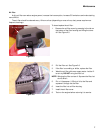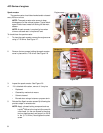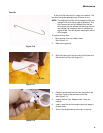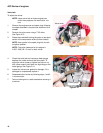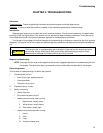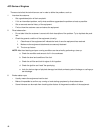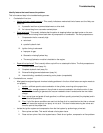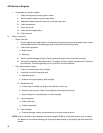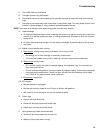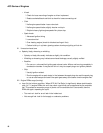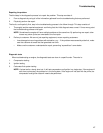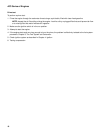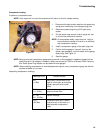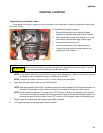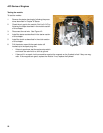
Troubleshooting
15
II. The muffler itself my be blocked.
III. The spark arrestor may be blocked.
IV. The exhaust valve may not be opening fully, possibly because of extremely loose valve lash set-
tings.
V. The exhaust valve seat may have come loose in the cylinder head. This may cause a loss of com-
pression, a flow blockage or it may randomly alternate between the two.
NOTE: The cause of an exhaust valve seat coming loose is usually over-heating.
VI. Intake blockage
a. An intake blockage up-stream of the carburetor will cause a rich fuel/air mixture and constrict the
amount of air that the engine can draw in, limiting performance. A blocked air filter is a common
cause of this.
b. An intake valve that does not open fully will cause a blockage. A possible cause of this is loose
valve lash.
VII. Makes unusual smoke when running
a. Black smoke
, usually heavy usually indicates a rich air fuel mixture
• Not enough air: air filter blockage or a partially closed choke.
• Too much fuel: needle valve stuck or metering / emulsion issues with the carburetor.
b. White smoke
, usually heavy
• Oil in muffler, usually the result of improper tipping. the engine will “fog” for a minute or so,
then clear-up on its own.
• Oil that is diluted with gasoline. It may be caused by improper tipping. It can also be caused by
leaky carburetor needle valve, if there is a down-hill path from the carburetor to the intake
port. Check oil for gasoline smell, repair carburetor.
c. Blue smoke,
usually light.
VIII. PCV system
a. May be blocked or unplugged.
b. May be over-come by massive over-filling or oil dilution with gasoline.
c. Will cause oil to exit the engine via any low-resistance paths.
IX. Piston rings
a. Confirm with leak-down test.
b. Smoke will be more pronounced under load.
c. Repair may not make economic sense.
X. Valve guides (and intake valve stem seal).
a. Smoke will be more pronounced on over-run.
b. Makes unusual noise when running.



